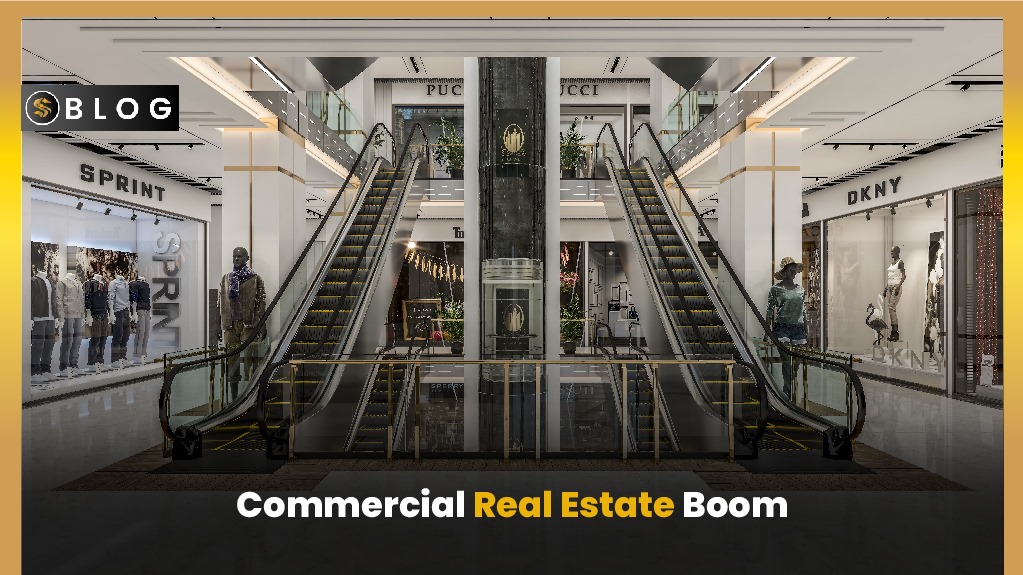
Share This Story, Choose Your Platform!
Capitalizing on the Commercial Real Estate Boom
The commercial real estate (CRE) market is a dynamic ecosystem influenced by a myriad of factors. While it has experienced periods of robust growth and investment, the current scenario is more nuanced.
Key Factors Shaping the Market
-
Economic Conditions:
Overall economic health, GDP growth, employment rates, and consumer confidence significantly impact CRE demand.
-
Interest Rates:
Rising interest rates can affect borrowing costs, impacting investment and property valuations.
-
Industry Trends:
Shifts in industries, such as the rise of e-commerce or remote work, can influence demand for different property types.
-
Supply and Demand:
The balance between property supply and demand in specific markets determines rental rates and property values.
-
Technology:
Technological advancements, such as prop-tech, are transforming the CRE industry and creating new investment opportunities.
Opportunities and Challenges
While certain sectors of the CRE market, like industrial and logistics, have shown resilience, others, such as office and retail, face challenges due to changing work and shopping habits.
-
Industrial and Logistics:
Strong e-commerce growth continues to drive demand for warehouse and distribution centres.
-
Multifamily Residential:
Rental housing remains in high demand due to population growth and changing demographics.
-
Office Space:
The shift towards remote and hybrid work models has impacted office demand, with some markets experiencing vacancies.
-
Retail:
The retail landscape is evolving, with a focus on experiential shopping and online-to-offline (O2O) strategies.
You May Also Read
Opal Mall & Luxury Suites: Twin Cities’ Best Project of the Year!
Navigating the Market
For investors, developers, and businesses, understanding the current market dynamics is crucial. Some key considerations include:
-
Market Selection:
Identifying markets with strong fundamentals and growth potential is essential.
-
Property Type:
Choosing property types that align with long-term market trends can mitigate risks.
-
Risk Management:
Diversification across property types and geographic locations can help manage risk.
-
Technology Adoption:
Embracing technology can improve operational efficiency and tenant experience.
Investment Strategies; Commercial Real Estate Boom
Investing in commercial real estate (CRE) can be a lucrative venture, but it requires a well-defined strategy.
Here are some common investment strategies:
Core Investment Strategy
- Focus: High-quality, stabilized properties in prime locations.
- Risk Profile: Low to moderate risk.
- Return Expectations: Moderate to stable returns.
Example: Class A office buildings in major metropolitan areas.
Core-Plus Investment Strategy
- Focus: High-quality properties with potential for value-add through improvements or repositioning.
- Risk Profile: Moderate.
- Return Expectations: Moderate to high returns.
Example: Office buildings in secondary markets with potential for renovation.
Value-Add Investment Strategy
- Focus: Distressed or underperforming properties with significant upside potential.
- Risk Profile: High.
- Return Expectations: High returns.
Example: Retail centres in declining areas with redevelopment opportunities.
Opportunistic Investment Strategy
- Focus: Highly speculative investments in emerging markets or property types.
- Risk Profile: Very high.
- Return Expectations: Potentially very high returns.
Example: Developing industrial properties in a rapidly growing region.
Other Investment Strategies
- Debt Investment: Lending money to property owners to finance acquisitions or developments.
- REIT Investment: Investing in Real Estate Investment Trusts, which own and operate income-generating real estate.
- Crowdfunding: Investing in real estate projects through online platforms.
Factors to Consider
- Risk Tolerance: Assess your comfort level with different levels of risk.
- Investment Horizon: Determine your desired holding period for the investment.
- Market Knowledge: Understand the specific market you’re targeting.
- Financial Resources: Evaluate your available capital and financing options.
- Diversification: Consider spreading your investments across different property types and locations.
Due Diligence
Thorough due diligence is crucial for successful CRE investments. This includes:
- Property evaluation
- Market analysis
- Financial analysis
- Legal review
- Environmental assessment
Do you need commercial spaces in Islamabad?
Islamabad’s skyline is set to transform with Opal Mall, the future epicenter of business and lifestyle. This isn’t just a mall; it’s a strategic investment opportunity. Positioned at the crossroads of convenience and opulence, Opal Mall offers commercial spaces that are primed to become the heart of Islamabad’s commercial activity. Envision your business thriving amidst a bustling crowd, surrounded by world-class amenities and unparalleled visibility. With its prime location and modern infrastructure, Opal Mall is not just a property; it’s a gateway to unprecedented success. Be part of the future, secure your commercial space today, and let Opal Mall propel your business to new heights.
To learn more Visit our website:
www.sapphireassociate.com
info@sapphireassociate.com
UAN +92 347 9043333




